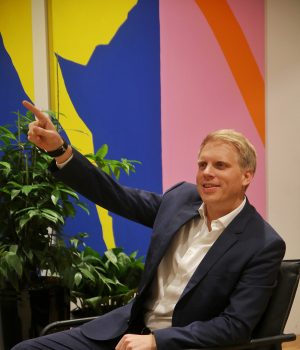This article appeared in the Norway-Asia Business Review. Click here to read the magazine.
Two years is a long time in the age of innovation. For Magnus Grimeland he went from Regional Managing Director and Co-Founder at Zalora to Chief Executive Officer of Antler, a startup generator.
“Zalora was an amazing journey and a lot of fun. It’s a great company,” Grimeland proclaimed. “Now with Antler, we want to help others build their own business.”
These days he is focusing on empowering the next wave of great technology startups.. From being a founder at a tech startup to helping the startup founders of today who may not know where to begin their own journey, it brings his journey full circle in many ways.
“The opportunity to build a business rarely exists,” Grimeland stated. “We really wanted to set up a platform that pulls out top talent from academia, business or anywhere else. The goal is to provide them with the tools and support that allows them to build great businesses. That’s why we started Antler.”
He added the company’s core vision came from a belief there is a lot of talent that wants to found their own business. The only thing stopping most of them is a lack of support and opportunities.
“We want to get people out from where they are and give them capital and business support to be successful,” Grimeland explained. “We will give them a global network and really enable them to build a business. It is a platform for great entrepreneurs.”
Many wonder when is the ideal time to create a startup. According to Grimeland, it’s a decision that can be made at any time.
“Making a decision to become a founder can really come at any point during a person’s career. We’ve seen recent graduates, those who finished MBAs, coders and people who have over 10 years working experience apply,” he noted. “There is no right or wrong time to become a founder. You just have to feel that now is the time to follow your dream of building something. We will let you try it.”
The biggest misconception some have about moving into the world of startups is that they must have the proverbial million-dollar idea to be successful. An idea for a startup can be useful, but it is not a requirement.
“You don’t need an idea or a clear product to work on. You just need to decide that you want to make a business that can change the world,” Grimeland proclaimed. “Nobody has the golden ticket idea when they start. It builds over time. There are lots of examples of companies building away from their initial vision, such as Microsoft and Facebook. It is more about having the drive and ability to succeed, not the idea.”
Antler has identified three areas where most startups fail. These are an inability to create a market, lack of cash and a team that might not be the right fit. The firm then supports founders to make sure they can navigate these challenges as well as other issues that may arise.
“We provide founders with a grant upfront as an initial investment. This allows them to focus on their vision, not funding,” Grimeland said. “We will also put together a team of co-founders that will help find the idea for their team to work on. From there, you can build a business.”
Knowledge and innovation

In order to be successful in the startup world, knowledge and innovation are necessities. For Antler, both of these need to be on the local level. As Grimeland found out during his time at Zalora, this can make a big difference as to whether a startup succeeds or fails in Southeast Asia.
“Local innovation is a big part of the process. Taking a global idea and making it suited for the local market is something that can be lost during the process,” Grimeland pointed out. “We think every company needs some sort of real innovation to be successful. This can be taking an existing idea and innovating it to the local market or it can be something entirely innovative on its own.”
As for knowledge, Antler has enlisted a team with experience at both the regional and global level. Advisors include Stefan Jung, Managing Partner at Venturra Capital, John Riady, Director of the Lippo Group, and Magnus Ekbom, Chief Strategy Officer at Lazada Group. The goal is to have a diverse knowledge base and local talent to create diversity.
“Knowledge at the local level is important too. We have really talented people from around the globe and can pair them with the top local talent,” Grimeland said. “We are looking for talent from the region, as well as globally. We really want to have diversity.”
Antler is currently interviewing founders and plans to start its first cycle in July. Additionally, work continues on building its own advisory board which will provide founders with knowledge and experience.
“We want to create a really strong advisory board with lots of experience and research,” Grimeland noted. “Strong mentors mean founders are twice as likely to succeed.“
Future potential
The road from Norway to Southeast Asia and from Zalora to Antler had its fair share of twist and turns. However, Grimeland has a clear idea of where he wants to be two years from now.
“In two years time, we will have built about 100-150 innovative tech companies owned by founders in Southeast Asia. Some of these companies will be on the path to being leaders in their fields,” Grimeland detailed. “We will also have expanded to Europe and South America. We hope to have helped 300-400 founders build successful businesses globally in the next two years.”


































